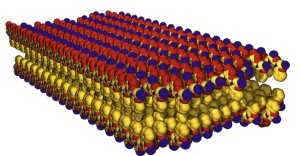
From the people who brought us peptoid nanosheets that form at the interface between air and water, now come peptoid nanosheets that form at the interface between oil and water. Scientists at the Molecular Foundry have developed peptoid nanosheets – two-dimensional biomimetic materials with customizable properties – that self-assemble at an oil-water interface. This new development opens the door to designing these sheets with increasing structural complexity and chemical functionality for a broad range of applications, including improved chemical sensors and separators,and safer, more effective drug delivery vehicles.
The substitution of oil in place of air creates a raft of new opportunities for the engineering and production of peptoid nanosheets. For example, the oil phase could contain chemical reagents, serve to minimize evaporation of the aqueous phase, or enable microfluidic production. The production of peptoid nanosheets in microfluidic devices enables the creation of combinatorial libraries of different functionalized nanosheets and the ability to screen them on a very small scale. This could lead to peptoid nanosheets that feature the molecular recognition and catalytic functions of proteins.

